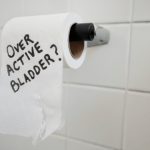
An overactive bladder (OAB) occurs when there is a problem with the bladder’s ability to store urine. In turn, a person with OAB will frequently go to the bathroom because they have a continuous urge to urinate. Worse yet, OAB can even result in incontinence – or an involuntary release of urine. This can be quite embarrassing and even prevent someone with OAB from attending social functions or leaving the house.
Causes of an overactive bladder

- Neurological disorders like Parkinson’s disease which can lead to involuntary bladder contractions
- High urine production which can be a result of high fluid intake or kidney problems
- Urinary tract infections
- Abnormalities of the bladder
- Obstruction of urine flow like an enlarged prostate or constipation
- Declining cognitive function, dementia
- Incomplete bladder emptying
Although these factors contribute to OAB, there are things you can do to help prevent an overactive bladder. Even if you’re not concerned about your bladder, these tips will ensure your bladder remains strong and you don’t fall victim to bladder issues later on in life.
Tips to prevent an overactive bladder

- Fiber
- Beans
- Apples
- Peas
- Whole-grains
- Vegetables
- Alcohol
- Caffeine
- Acidic fruits
- Artificial sweeteners
These items have been shown to irritate the bladder, thus giving you a stronger urge to urinate.
Manage medical conditions: Even if you don’t have an OAB yet, other medical conditions can contribute to an overactive bladder. Conditions like diabetes can contribute to symptoms of an overactive bladder.
Lose weight: The heavier you are, the more weight and pressure will be put onto your bladder which can cause it to act up. If you are overweight, try working to lose weight in order to reduce pressure on your bladder.
Exercise: Not only will regular physical activity contribute to weight loss, but there are bladder-specific exercises you can do anywhere and anytime to strengthen your pelvic floor. They’re called Kegels and involve contracting your pelvic floor, similar to how you would if you were holding in urine. Simply contract, hold and release. Completing this exercise will help you have a stronger pelvic floor and better control of your urine to reduce leakage.
Regulate your bowel movements: Constipation is a serious condition on its own, but when you’re constipated it also puts more pressure on your bladder. Eat a diet which promotes regularity as well as drinking plenty of water. Exercise promotes bowel movements as well.
These are just six easy ways you can begin to promote better bladder function and prevent the onset of an overactive bladder. You can be an active player in your bladder’s abilities, so why not try some of these tips today?